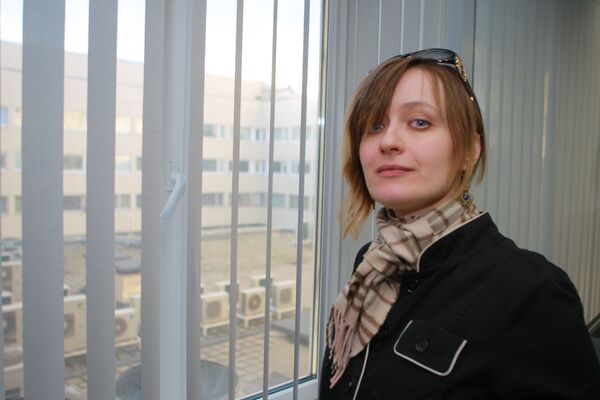“He has a disability! What does he need his own apartment for?”
I’ve heard a lot of stupid things in my lifetime, but every once in a while, people still have the power to surprise me.
The person, on this occasion, was one of my neighbors. A middle-aged woman fond of denim overalls and moralizing, she keeps a close watch on all the comings and goings in our building, and dutifully spreads the day’s gossip to anyone within earshot - whether you want to listen to her or not. I suppose every residential building in Moscow plays host to at least one woman like this - a bully who attempts to deal with her own feelings of worthlessness via establishing an image of middle-class propriety, the sort of person who is “offended” by Metallica t-shirts, laughter on the stairwell, and other people’s fun.
That day, she was nattering on about something that concerns me directly. Namely - the legal conflict currently raging over the apartment my husband and I live in. After our elderly landlady died, it was revealed that she had willed the apartment to her grandson - along with several other properties she had in her name. Her widowed husband, who is actually registered in the apartment, even though he does not live there (Russia’s archaic registration system, by the way, makes for an interesting separate topic, and one that I will most likely revisit in weeks to come, so watch this space) protested.
Threats were exchanged and lawyers were hired. Relatives, friends and neighbors took sides.
The gossipping neighbor - let’s call her Irina - is not on the grandson’s side. It’s not that she has much sympathy for his grandfather, who still has another property in his name, it’s that she doesn’t think that people with disabilities need to own their own property. After all, they are disabled! It’s not as though they have lives!
Our young landlord’s mother, who effectively manages his affairs while he attends college, did tell me that he was hit by a car as a child. He thankfully recovered, but the recovery process was a long one - and he was granted disability status. Nowadays, he’s just a regular college kid, albeit one who has memories of painful physical therapy and can appreciate the plight of people with disabilities in Russia, particularly for those who are confined to wheelchairs in a place where wheelchair access is still frequently unavailable.
Irina’s ridiculous belief that people with disabilities don’t “need” to own property is not as rare as you might think, although these kinds of views are slowly but surely going out of style in modern Russia. One of my friend’s children is partially deaf, for example - a well-meaning relative regularly dogs her about trying to get her son an education because he “doesn’t need it.”
Ask these people what they have against folks with disabilities: “Nothing! Nothing at all!” they will protest. They just want these folks to be “comfortable” and “taken care of” and to not experience “undue strain.” Because the mere word “disability” terrifies these people and immediately makes them imagine terrible suffering and total inadequacy, they imagine that regular pursuits, such as going to school, or moving out of one’s parents’ house, are beyond reach for all people with disabilities.
The property question is interesting in this context in particular because most of the people with disabilities whom I know in Moscow are desperate to have their own space. Prices are ridiculously inflated, of course, and so-called social housing is hard to come by - even for war vets. But for a person with a disability who is working on establishing his or her independence, living separately from relatives is particularly important. The culture that views people with disabilities as helpless charity cases who require constant supervision from their saintly relatives is receding. But it will recede faster if those who are able to live on their own are actually allowed to do so.
What did I tell Irina that day? I’m ashamed to say that I just stared at her, dumbfounded.
I did think of a few snappy comebacks later.
I’ll be waiting for us to cross paths again.
The views expressed in this article are the author's and do not necessarily represent those of RIA Novosti.
Trendwatching in Russia is an extreme sport: if you’re not dodging champagne corks at weddings, you’re busy avoiding getting trampled by spike heels on public transportation. Thankfully, due to an amazing combination of masochism and bravado, I will do it for you while you read all about it from the safety of your living room.
Natalia Antonova is the deputy editor of The Moscow News. She also works as a playwright – her work has been featured at the Lyubimovka Festival in Moscow and Gogolfest in Kiev, Ukraine. She was born in Ukraine, but spent most of her life in the United States. She graduated from Duke University, where she majored in English and Slavic Literature. Before coming to Moscow, she worked in Dubai, UAE and Amman, Jordan. Her writing has been featured in The Guardian, Foreign Policy, Russia Profile, AlterNet, et al.
Trendwatcher: Krasnodar - It’ll Rain a Sunny Day?
Trendwatcher: Glory & Balaclavas at Moscow International Film Festival
Trendwatcher: Smile Like You Mean It
Trendwatcher: In the Zone for Euro 2012
Trendwatcher: Old Farts & Pointless Papers
Trendwatcher: “Slumming it” at Moscow’s Jean-Jacques
Trendwatcher: Vacation time for Ugly Americans (and Brits, and Russians)
Trendwatcher: Where the Grass is Green and the Girls are Pretty
Trendwatching: The Unbearable Lightness of Being a Russian Pilot
Trendswatcher: Of Parking and PR Disasters

